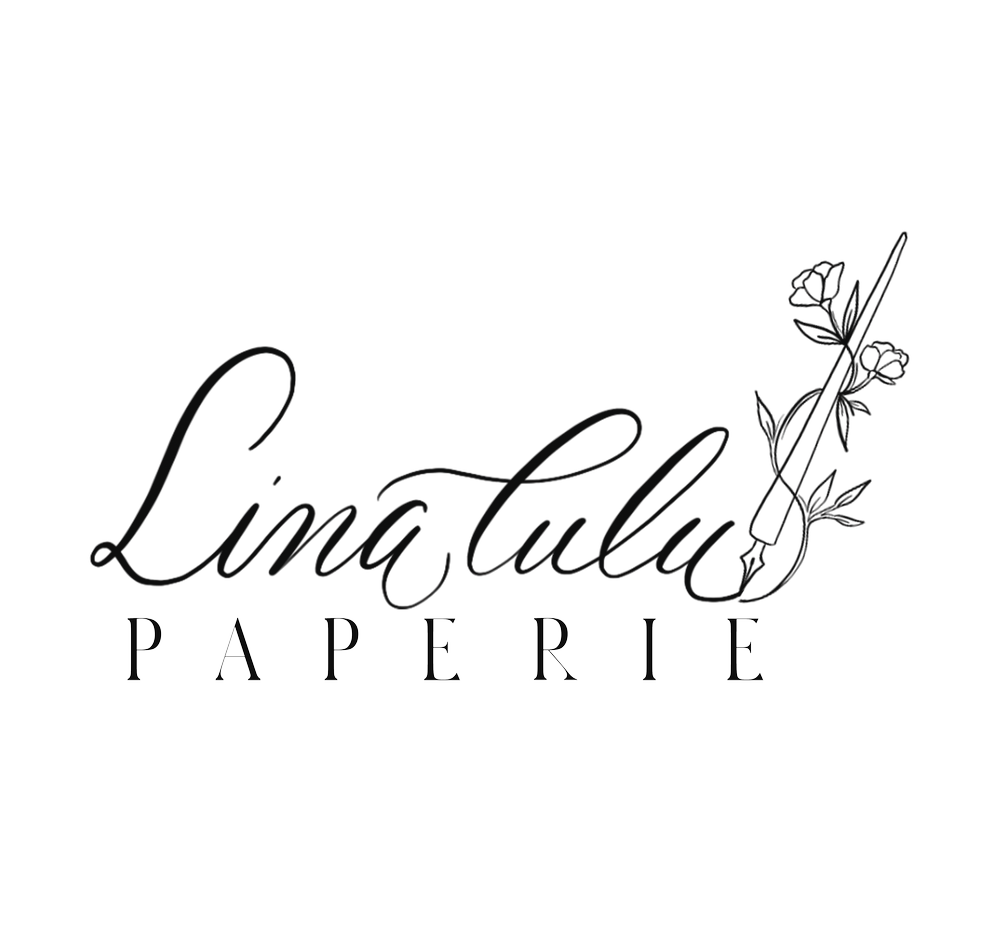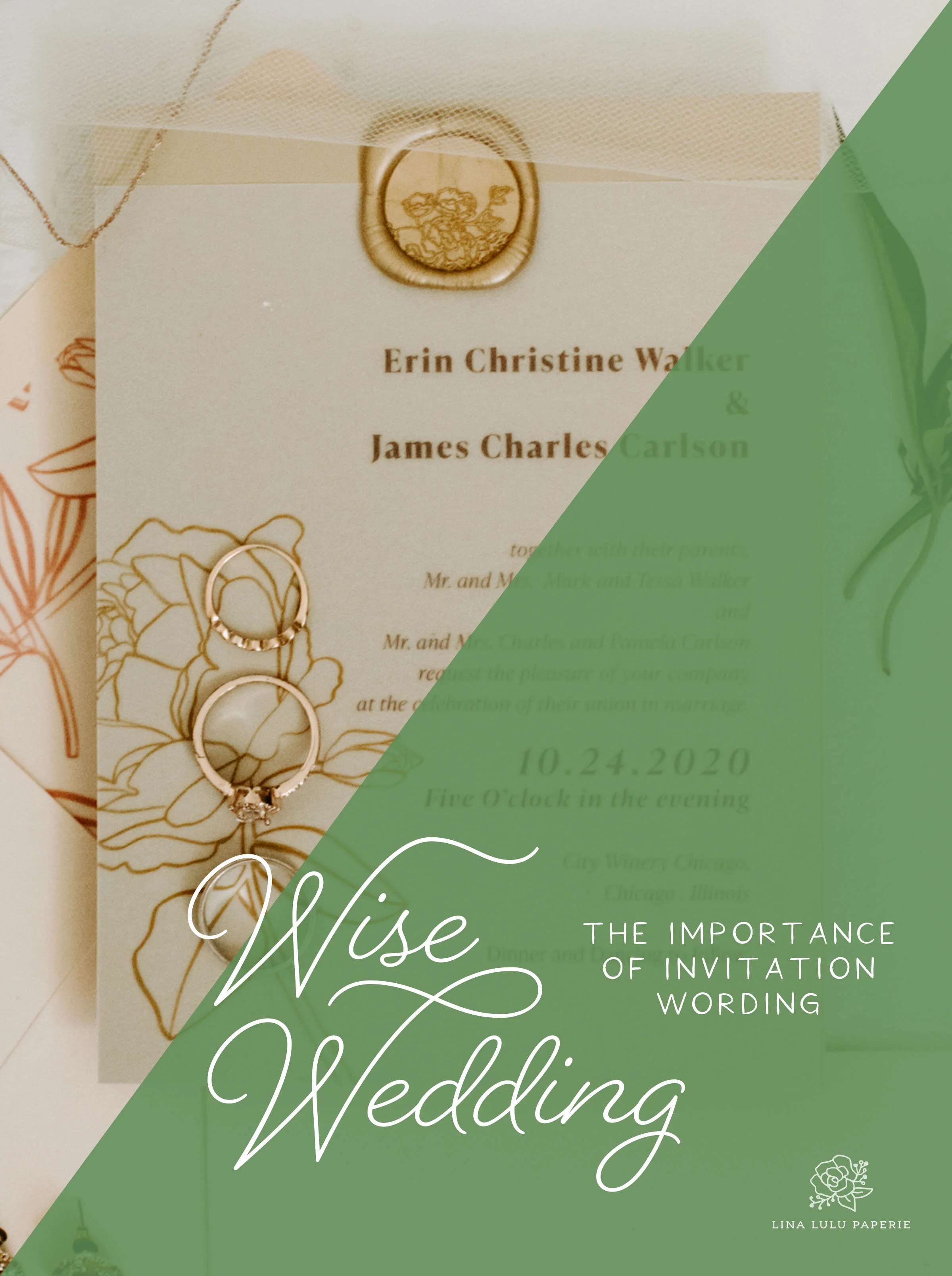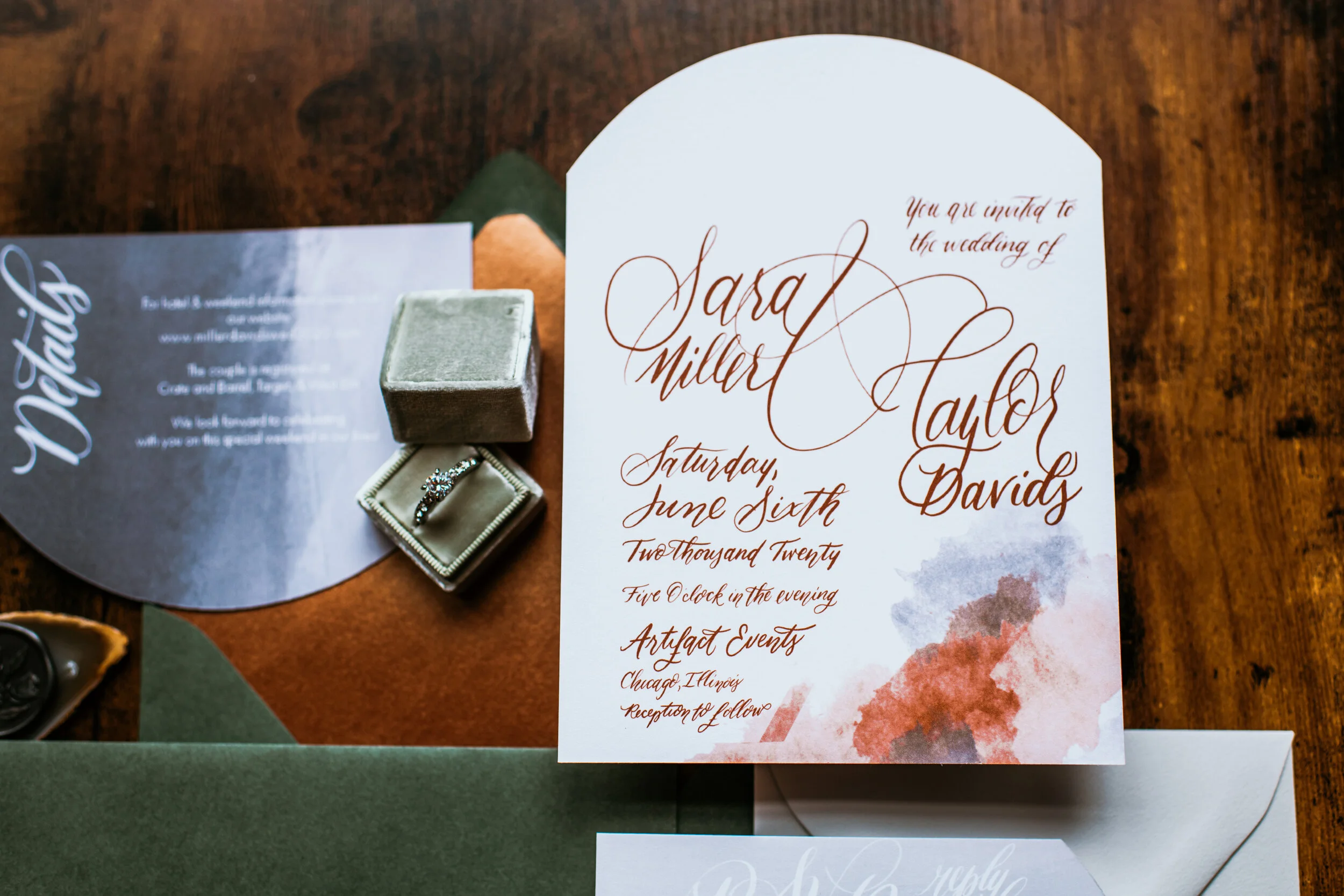Though many weddings these days walk the fine line of traditional and breaking “the rules”, one important category of rules to follow is what to include in your invitations, specifically the wording.
Many people choose to go traditional on the wording without considering the origin of the order of the invitation wording. Today, I will be breaking down the way an invite is written and common phrasing you can use.
The Host Line
The opening line of your invite is the space which indicates the host or hosts of the wedding. Traditionally, a bride parent’s would pay for the wedding and they would be considered the host of the wedding and party. Thus the common phrase for the host line would read:
“ Mr. and Mrs. Jam invites you to celebrate the wedding of their daughter…”
Now, in our modern times, many couples are opting to pay for their own wedding, or receiving financial contributions from one or multiple parents. Here are a few helpful tips to navigate your wording:
If you (the couple to be wed) are paying for your wedding, you do not have to include a host line.
The word “and” between two names traditionally implies the two people are married
Very Formal: Mr. and Mrs. David Charles Jam…
Formal: Mr. and Mrs. David Jam… OR Mr. and Mrs. David and Cheryl Jam…
Casual: David and Cheryl Jam…If your parents are divorced, keep both names on a separate line, with the mother’s name first. You still keep both names on separate lines, even if they are not remarried
If just one divorced parent is hosting, their name is included on the first line
If you are including a name of a step-parent, include it on the same line as their partner
Not Remarried:
Mrs. Cheryl Jam
Mr. David Jam
Remarried with Step-Parent(s)
Mrs. Cheryl Jam Davis and Mr. Joseph Davis,
Mr. David Jam
Both Sets of Parents:Very Formal:
Mr. and Mrs. David Charles Jam
and Mr. and Mrs. Stephen Matthew Berd
Formal:
Mr. and Mrs. David Jam
and Mr. and Mrs. Stephen BerdCasual:
David and Cheryl Jam
with Stephen and Jessica Berd( Note: Different'-sex couples the bride’s parents are named first then the groom’s parents. In same-sex couples, the preference of who’s parent’s name is first is up to the couple or how it looks best with the design of the invite.
If all parents are financially contributing, place the bride’s parents first and then groom’s parents names
Names should not be listed in order of who is financially contributing more
Hosts who are not married should have names on separate lines
If you choose to include a deceased parent name, you will need to rearrange the wording as they can not actually serve as host. A common way to honor the deceased parent is to put it alongside the child’s name such as “ Marie Elizabeth Jam, Daughter of David Jam” or “ Marie Elizabeth Jam, Daughter of the late David Jam”
You can exclude the formal titles, i.e. Mr. or Mrs. for a more casual wording option
If the couple is paying with some assisitance from either parents or no assitance, use one of these common phrases:
The Couple is Paying:
with their parents:
Together with their families…
Together with our parents…on their own:
With great joy…
With full hearts…
The honor of your prescence is requested at the wedding of…
<Name of couple> invite you to share in their joy…
The Request
After the host line, you include a request line. This line is asking your guests to join you at this joyous occasion, and set’s the tone for your wedding. This wording can range from super formal to casual. The tone can be conveyed in the style of wording you choose to go with. Such as:
The phrase “honor of your presence” notes a religious aspect to your ceremony.
The phrase “pleasure of your company” notes a non-religious ceremony.
For a more formal wording, you can use such words as honor, pleasure, or cordially, i.e. “…request the honor of your presence…” or “…cordially invite you to the wedding of…”
For more casual wording, use phrases such as “love for you to join”, “joyfully request…”, “invite you to celebrate…” or “invite you you to join the celebration…”
For a very casual wedding, use phrases such as “would love your company…”, “join in the festivities…” or “want you to come party with …”
The Action
Now that you have established the host and formally asked your guest to join you, let them know what they are joing to celebrate, or more accuratly—who.
Traditinally this is the line where the parents of the bride ask the guest to join them “ at the marriage of their daughter…”
If both parents are hosting, the line would read, “ at the marriage of their children…”
If you as the couple are hosting, the phrasing may include “ as they say "‘I DO’; “as they join in the union of marriage…” or “as they celebrate their marriage…”
The Couples Name
The most important information on the invite might seem the easiest, but there are a few items to decide on.
For differnet-sex couples, the brides name is traditionally listed first. If her parents are hosting, her first and middle name can just be listed with out her maiden name followed by the grooms full name and then his parents names.
For same-sex couples, you can list the names by choice or alphabetically. If one set of parent’s is listed as the host, put their child’s name first.
Writting out full names are often regarded as formal. For a less formal feel, opt to only include fist and last name or first and middle names when parents names are listed as well.
The Date and Time
The date and time are staright forward, but just as the other portions of your invite, you mst decide how formal you would like to have it.
Traditionally, the date and time are fully written out, incuding the year
The day and month should be capatilized, and the year should be lower-case.
The time should be spelled out. If your time is on the half-hour, using “half-after” is more traditional. Using “half-past” or the word”thirty” after the time is the more casual version.
Evenings begin at five o’clock. You do not have to state “morning”, “afternoon” or “evening” unless it falls btween 8, 9 , or 10 as these could be morning ceremony times. You can state the time and then the pharse “in the evening…” but it is not necessary or traditional.
These rules can be broken in more contemporary designs.
The Location or Locations
This information of location follows the date and time on your invite.
For the ceremony, list the venue name on one line, and on a seperate following line include the city and state fully written out.
If you are having the ceremony and recption at the same place, use the phrase “ Reception to Follow” or “ Dinner and Drinks to follow” to let guests know on the followling line.
The Reception
If you are having the recepetion at a seperate location, let your guests know by only including the venue name and not the address on the invite on the line below the ceremony information. You can include a reception card with the additional information of address or any parking information.
This line can be used to again let your guests know the formality of the recption with phrases such as “Dinner, dancing and merriement to follow”, or “An evenign of celebration to follow”
If you are not serving a full meal, use this space to notify the guests: “Punch and cake to follow” “ A dessert reception to folllow” or “Drinks and dancing to come!”
The Dress Code
Some couples want a specific dress-code to be followed for their big day. If you are having a black-tie wedding, this must be included on the invite. For any other dress code, you can state it at the end of the invite after the reception line.
You can also include a note on the details card of your invite suite or on your wedding website. If you do not state a dress code, guests will pick up clues from the invite through look and wording on how formal a wedding will be.
Like with any part of your wedding, choose the wording on yor invite that works with your personalities and you style of your day!



